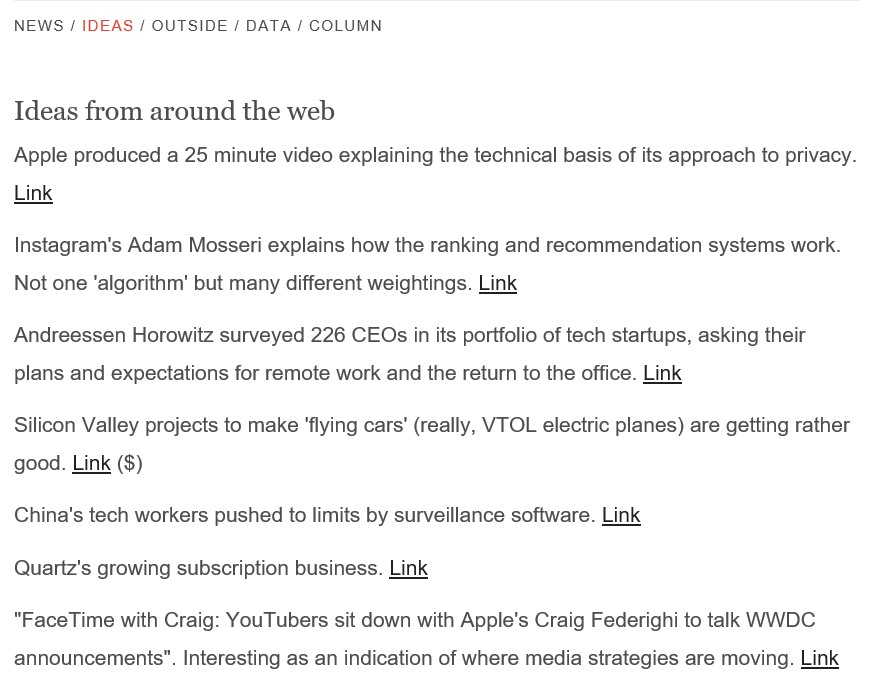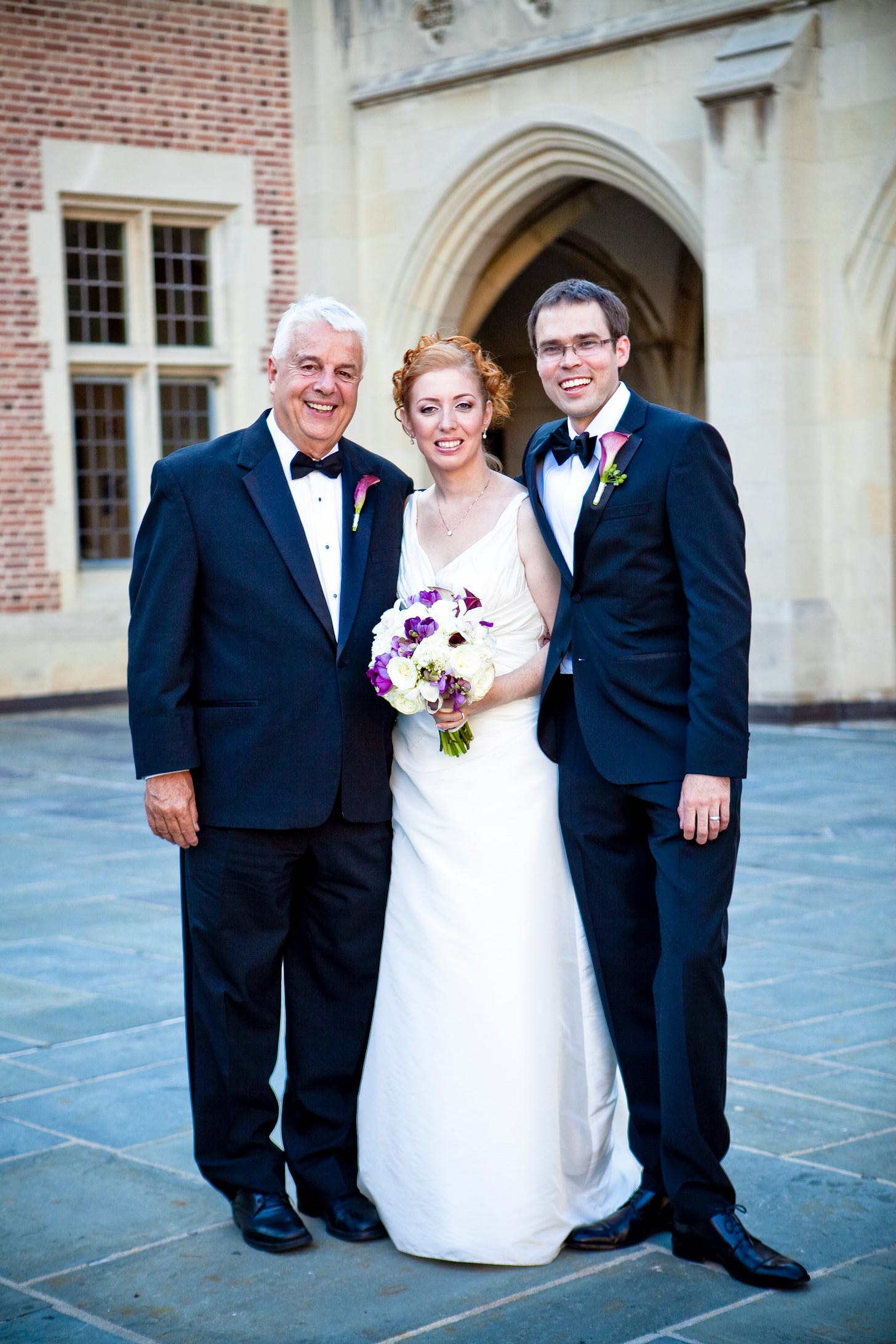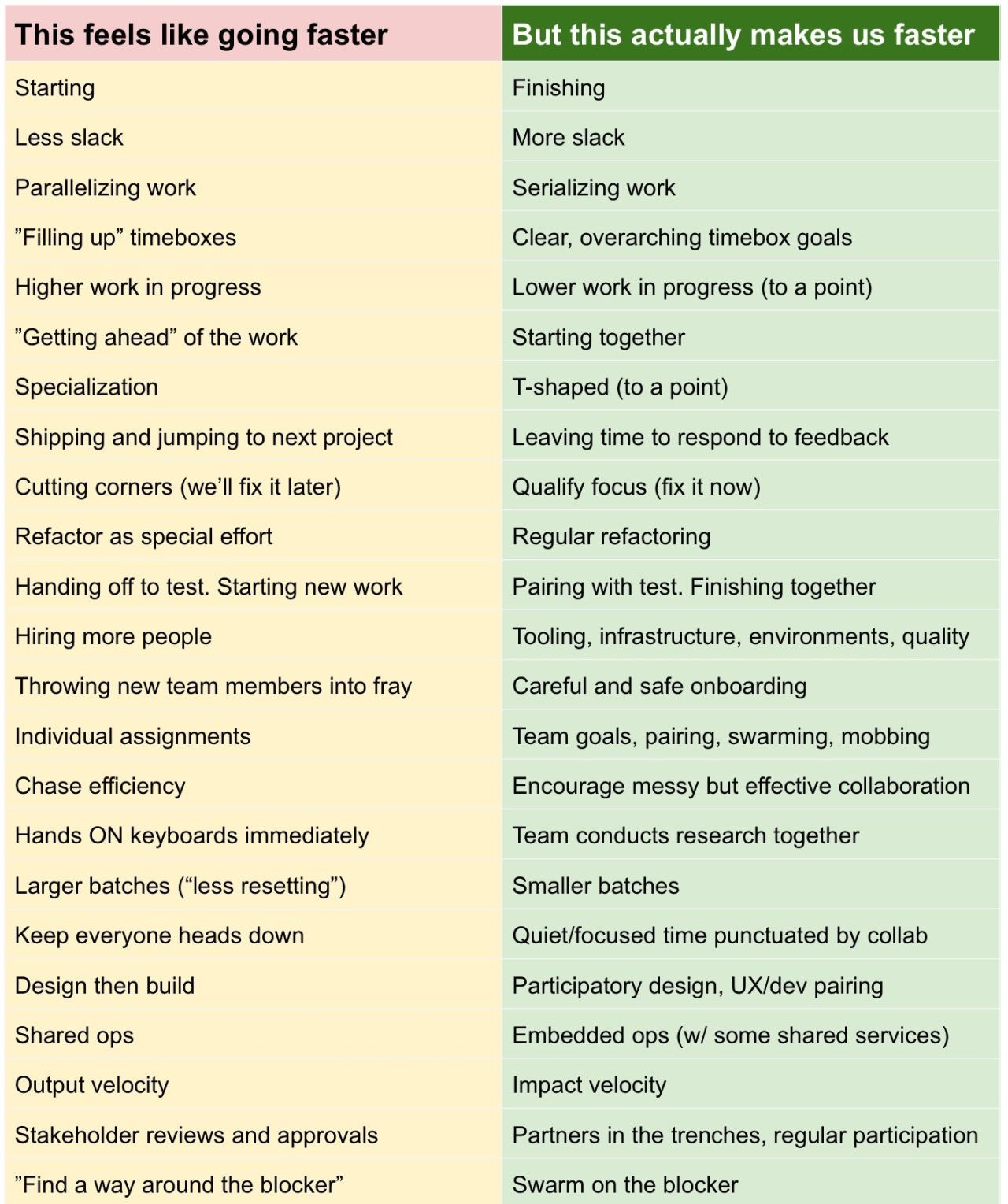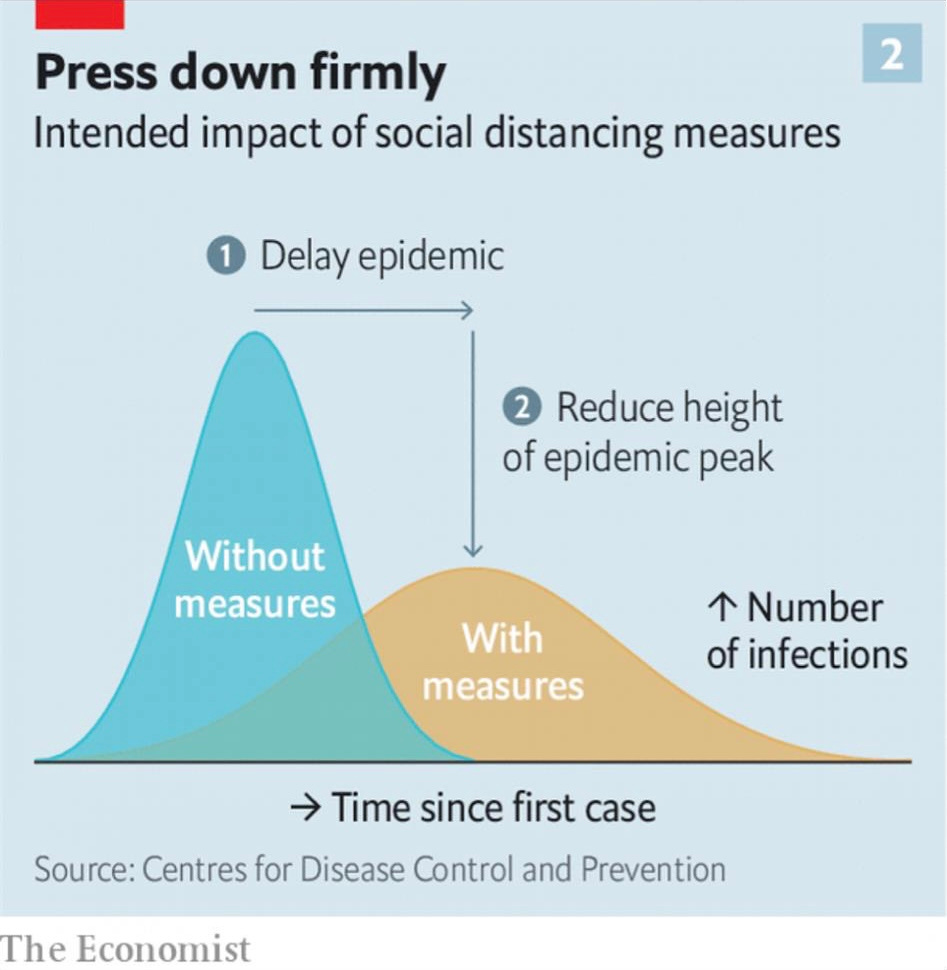My Information Diet
Staying info-nutritious: Recs for news outlets, analysis, podcasts, and newsletter subscriptions from an information junkie
👋 Hi subscribers! Helen and Adam here! Welcome to Mind The Beet – a weekly Sunday morning slice of life newsletter with thought provoking essays on career, leadership, and parenting. We often throw in some product recommendations and that’s the focus of this week’s post: advice to new grads just starting out their careers on how to develop a habit of consuming the right news and information. A few of our other product rec topics have been: 📸 Products in our home telepresence studio, 📚 Top 5 children’s books in our library, and 🌌 Seven modern sci-fi books. You can view all our previous articles here: https://mindthebeet.com/articles.
Know someone graduating and entering the workforce? Consider a forward and share with a few of your own recs thrown in!
– Helen and Adam
P.S. If this got forwarded to you and you want to subscribe for free to see our weekly posts, we’ll make it easy for you:
When I graduated college over a decade and a half ago, I got many pieces of advice from elders. The one that stuck with me the most was from Dr. Rick Tuttle, a student leadership advisor to both Helen and me and it was this: Subscribe to The Economist magazine.
On the one hand, it was just a simple recommendation to a particular type of journalism. Why was it so memorable? Simply stated, it encouraged me to take the information I chose to consume seriously and make it a part of my identity. Given the magazine’s bent towards a global perspective for world leaders, it showed his confidence in me that I was worthy of growing to enter that class.
It was a gift that Dr. Tuttle gave Helen and me, although I suppose it wasn’t the greatest one – as he did end up officiating our wedding several years later:
Consuming news, analysis, and information has been both a habit and a hobby I’ve developed since. It’s been one of the most important career enablers in my job because it’s provided me with the broader context I’ve needed to make career decisions. Consuming information – about the world, my industry, and my profession – is how I develop intuition, something I find my organization prioritizes as I get more senior in my career.
So whether you are a new grad looking to develop habits or just looking for a few content recs, here’s my own blueprint of the information I consume on a weekly basis. Call it my Information Diet and I try to include tips on staying info-nutritious in an increasingly info-junk world.
Industry News & Analysis
It’s part of my job to stay updated with what’s going on in my industry. If you are a new graduate, making this a part of your weekly habits can accelerate your early career and differentiate you.
I’ve tried industry periodicals over the years, but found them too surface level. My steady state here has been a good content aggregator that can find the best piece on any given news event + key sovereign analysts:
TechMeme. This is the one news aggregator I’ve let into my Information Diet. It’s curated by humans but with little original content of its own – it’s features breaking news updates on the latest in my industry. It’s widely recognized in the industry and my company’s PR teams cite how high a media push was on the site in their recaps.
Benedict Evans. Benedict is a fantastic author with a succinct and sardonic writing style and content that is a mix of news summary + analysis. He has a weekly free newsletter with 160K subscribers with the stated topic of “what happened in tech that actually mattered, and what it means” and his paid newsletter is one of my favorite weekly reads.

Stratechery by Ben Thompson. A taste maker for our industry, Ben is one of the first sovereign authors before that was a term of art. He’s managed to democratize (and monetize) what would ordinarily be a tech company’s in house strategy department’s work, and he’s used his influence to score great interviews and insider news.

Acquired.fm. “Learn the playbooks that built the world’s great companies.” Ben Gilbert and David Rosenthal run a fantastic podcast that recount the founders’ stories and strategy for major firms in our industry. It’s been especially useful for perspective on the Chinese market and venture capital’s perspective. The histories of Airbnb, Sequoia and Pinduoduo have been my favorites.
Product Hunt. Hard to keep up with, but this is a fantastic site for discovering new products in our industry. When I can, I try to just do some serendipitous exploration 2-3 times a month.
My Professional Skills: Product Management
This was the biggest hole in my early-in-career information strategy. I just didn’t appreciate how much wealth of insights there was by reading up on the skills of my profession, separate from my industry. This is the one area where now I let social media into my information life as being in the flow with the experts in my industry has been a rich source of staying on trend.
John Cutler’s Beautiful Mess. Fantastic infographics and short article on the skills of product management. Here’s one example on product agility myths:
Shreyas Doshi: Prolific Twitter presence and former product builder at Stripe, Google, and elsewhere. Worth a follow for near weekly gems on the struggle that is product making.
Lenny’s Newsletter: Well known as one of the most popular product management newsletters. His content is targeted to those who like to skim vs. read in depth, and the content is high level that it’s geared towards those new to the industry.
There are a few new entrants to the product newsletter game that I’ve grown to appreciate:
Deb Liu’s Perspectives: Former Facebook Product Executive and now a CEO, she just started her Substack this year as she started a new job. She often covers the more human elements of being a tech professional. Her post on what a Growth team should focus on is my favorite.
Will Lawrence’s Product Life: A writing style that seems to ooze growth hacking lifestyle, Product Life has straight-to-the-point guidance from someone in early/midcareer in product. I really appreciated his post on his newsletter journey and tactics he used to focus and scale.
Great book recommendations are outside the scope of this post, but this section feels incomplete if I didn’t mention the work of Marty Cagan from Silicon Valley Product Group. His book Inspired is the #1 book I recommend to new product managers and his brand new book Empowered is on my summer vacation reading list.
Leadership
I framed that an outcome of my Information Diet was to develop intuition, and intuition on influencing people, building coalition, and storytelling is a large part of most knowledge worker jobs. Here’s a few recs in that area:
Finding Mastery Podcast by Michael Gervais. A sports psychologist interviews leaders, mostly sports coaches but not always, about high performance and being in the flow. Gervais is a fantastic interviewer who gets people to open up about their personal struggles yet synthesizes how to apply it to the life of his listeners.
Brené Brown’s Dare to Lead Podcast. If you’ve subscribed to Mind the Beet for a while, you know our philosophy on leadership is rooted in allyship and vulnerability. Brené is the public face of vulnerability. Her interviews with both Barak Obama and Joe Biden this past year were real highlights for both of us. Helen is actually going to meet Brené soon as part of a charity auction prize!
The Moth Storytelling Podcast. The Moth is an organization dedicated to the craft of storytelling and their podcast features the best of their “story slams” – true stories told live without notes to an audience. Not only are the stories fantastic, but it inspires clarity in communication in my own work life.
Again the topic of this post is not books, but because it happened to just cross my LinkedIn feed, I’ll mention that my colleague Michael Affronti recently compiled an excellent list of leadership books from his network: Best Management Books.
Journalism
So far I’ve talked about how to be a knowledgeable information worker, using examples of my profession and industry (tech and product management), but the base principles apply to many jobs. In addition, my information diet hobby involves consuming news and staying up to date as a citizen of the world.
My approach to journalism may seem obvious (I essentially recommend the most well known and commercially successful journalistic entities in the world) - but that’s the point and there is an intentional philosophy around this, namely that I a) avoid infotainment, TV, social media and AI-based aggregators as sources of news b) prioritize the highest quality journalism c) find a counterbalance to whatever is my primary source and d) support local news. I don’t have a problem with quality organizations being gatekeepers – in fact, I pay a premium for that synthesis. Here are some details:
The New York Times. It’s clear to me that the NYT is one of the few journalism organizations to cross the chasm to a new economic model and is pouring the profit into redefining quality journalism. This fantastic analyst report delves just into how the organization has transformed itself and how they prioritize paying journalists.

Wall Street Journal. The NYT has a bias for David over Goliath and stories that prioritize those marginalized by the system. Admirable and aligned with my philosophy that most big systems (e.g. government, news, corporations) should be biased in that way, but I wanted a counterweight – an outlet that embraces a more factual reporting on the systems in our society. WSJ is a great complement to the NYT in this respect. Both are pretty centrist overall and that is my goal; I want to support quality journalism vs. extremes and find other ways (see below) of consuming diverse perspectives.
Seattle Times. I make it a point to prioritize news of my local community. Like many, I’ve noticed the steep decline in quality for local news compared to just a decade ago – but keeping up with local news makes me a more interesting conversationalist with fellow parents and neighbors.
News Analysis
What do I mean by analysis as separate from news? Well, the year 2020 put that into relief for me. While the major breaking news outlets were trying to cover the very latest COVID news in the Spring, it was The Economist that taught me the big picture that was going to shape the year. The very first place I learned about social distancing and “flattening the curve” was in their synthesis, weeks before other major breaking news outlet:
Part of being an information junkie is to make room for more than just breaking news but also prioritizing synthesis and pattern matching that allows intuition to develop. And not surprisingly if you read my intro, The Economist magazine is my choice for news analysis. I enjoy a non-US centric opinion, but still Western, and one that is globalist in nature.
I find some people are turned off by the name, thinking it’s for only economists by trade. Let me shed a light on this: The Economist is a British weekly magazine that covers the entire events of the world. Founded in the 1800’s, it has championed for a global approach to world development (founded to combat protectionist tariffs) and is the world leader in data journalism. I find their detachment from what’s going on refreshing and less agenda driven that the journalism I list in the above section.
There is room in my life for more news analysis, so it’s a growth area for me. I want to prioritize sovereign news analysts who are starting to gain momentum (like Letter from an American) as well as the perspective of the emerging China.
Diverse Perspectives
This is a relatively new area of my Information Diet, but as I’ve talked about before, I’ve prioritized perspectives different than my own in my reading habits. Here are a few recs from me:
Better Allies Newsletter. 5 tips once a week on how to be an ally to create an inclusive workplace.
NY Times In Her Words Newsletter. A twice weekly newsletter on gender, women, and society.
Long Now Foundation Podcast. The Long Now foundation seeks to counterbalance traditional thinking with interesting talks and projects focused on the 10,000 year time horizon. I find it a fantastic way of broadening my thinking on culture, product, and government.
In Closing
Like anyone discussing their own hobby, the trick is not to get overwhelmed. I have busy weeks where I get to little of the above content – and I always have a queue I feel slightly guilty about. Regardless of whether you plan to make this a small or large part of your time, I do encourage new grads entering the workforce to make a plan on their Information Diet. Not only is it a great career accelerator, but more and more jobs require you to get great at quickly consuming the right information and this is a way to build the muscle.
Coda on Privilege
We end every Mind the Beet post with a discussion of privilege and ways we give back. To a certain degree, we consider the subscription fees for the content above as a form of supporting important institutions that matter to us. Not only do we derive direct benefit, but the positive externalities of a thriving information ecosystem is critical to our generation.
However, I couldn’t close my post on journalism without mentioning the very first organization I supported with my company’s matching gift effort when I started 16 years ago: my local NPR station, KUOW. I mentioned above the decline in print journalism at the local level, and local public radio has been playing an increasingly important role in filling the void - it’s worthy of all our support.







